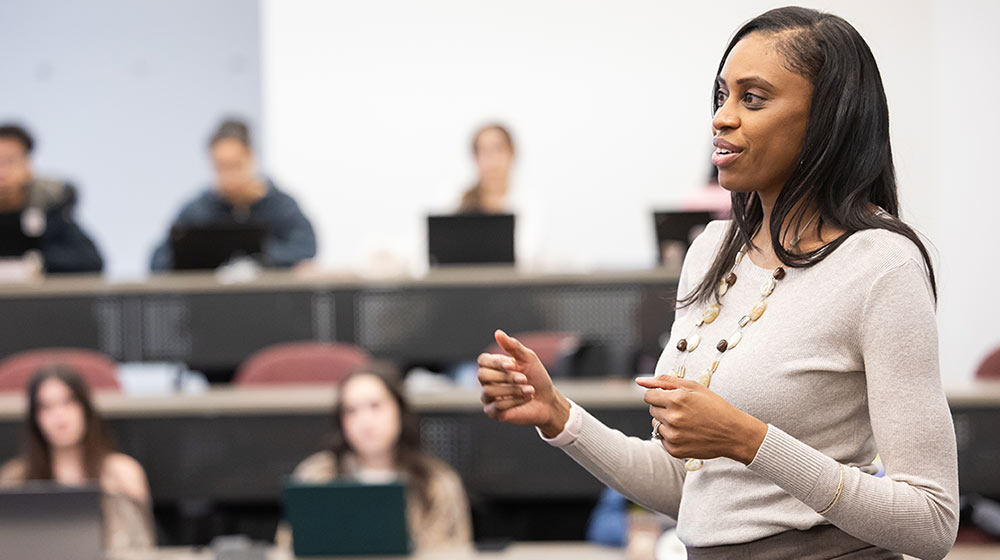Research for a more equitable world

Assistant Professor Danielle Booker has dedicated her career to inspiring change in the auditing and accounting industries. This takes many forms in her work, including applying psychology to auditor judgment and decision-making research, examining representation in accounting, and incorporating professional technologies into her accounting courses.
In recognition of her achievements, Booker was named a 40 Under 40 honoree by CPA Practice Advisor for 2023.
Below, Booker talks about her research and teaching, as well as the difference her work is making.
What are your research areas?
I conduct research in three major areas: auditor judgment and decision-making, DEI in accounting, and audit innovation.
Decision-making research is important because auditors have such an important role to play in serving the public interest and building confidence in the capital markets. Auditors are expected to give an independent, objective, unbiased opinion of a company’s financial statements. If auditors issue the wrong opinion, companies and investors who rely on that opinion could be significantly impacted.
My research identifies factors to help improve auditors’ judgments. Specifically, I use psychology and management literature to examine whether increasing auditors’ awareness of cultural differences improves their decision-making when reviewing the work of auditors from different countries.
Related to DEI, the accounting profession is becoming more diverse, but coursework and work cultures often don’t keep up. In one of my studies, we reviewed over 300 accounting case studies used in the classroom, and we identified that only 2 of those over 300 examined included minority representation.
As educators, we need to help all students see that accounting is a profession where they can thrive. Increased representation in the accounting curriculum is one way to help normalize the existence of underrepresented minorities in the accounting profession. In a different study, we provided evidence that DEI programming enhances students’ awareness of and attitudes toward DEI issues, ultimately preparing them to effectively communicate and collaborate in a diverse work environment.
For audit innovation, this research is important because the skillsets of auditors are changing. Accounting firms have significantly invested in innovative audit data analytics tools and artificial intelligence. Auditors now need more advanced critical thinking and data analysis skills to add to their basic accounting knowledge.
In my research, we interviewed practicing auditors to help determine the extent to which audit educators need to expose students to the tools and technologies they need to have an edge in today’s accounting industry. The results of this study help better align the incorporation of new technology into the auditing curriculum with how it is integrated in the industry.
What do you find most interesting about your research?
I conduct experiments so the most interesting part for me is understanding the psychology behind the decision-making process. Learning about the different types of theories and strategies that can be implemented to improve an auditor’s decision-making is interesting. I also conduct interviews with accounting professionals so it’s interesting to gain insight into their experiences and the reasons behind their decisions.
I’ve also been thrilled that educators are embracing the outcomes of my DEI research and using it to help improve the classroom. I’m passionate about helping increase representation in the accounting profession and my research provides the opportunity to contribute towards that effort.
How does your research impact your teaching?
It informs all that I do in the classroom. My interviews with industry experts drive the emerging tools and skill sets that I bring into the classroom, helping keep the classroom relevant with the latest industry practices.
My research directly addresses the need for a more inclusive accounting curriculum. I ensure that the materials I use in the classroom are diverse so that all students can see themselves represented in the profession. I am also helping students improve and become more aware of their decision-making process before they enter the profession.
How does being at Quinlan help your research?
Quinlan offers opportunities for grants to support my research studies, enabling me to collect the data I need. I also enjoy the support I receive from bouncing my ideas off my fellow Quinlan faculty. Quinlan’s location in the heart of Chicago provides the opportunity to connect with current audit professionals for my research, many of which I find with the help of Quinlan’s great alumni network.
Overall, Quinlan provides me the access, network, and funding I need to conduct serviceable research.